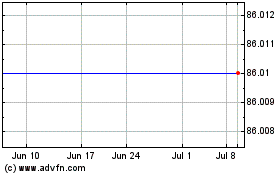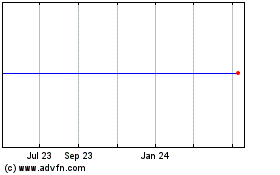United Technologies Profit Rises as Break-Up Looms -- Update
January 28 2020 - 11:29AM
Dow Jones News
By Thomas Gryta
United Technologies Corp. posted higher fourth-quarter profit
and sales while warning that Boeing Co.'s problems with its 737 MAX
airliner will hurt results in its Collins Aerospace business.
The conglomerate's cash flow came in stronger than expected by
Wall Street, largely because of timing around the costs of various
deals as the company works toward breaking up.
UTC recently got needed tax rulings in the U.S. and Canada and
expects the spinoff of two major businesses in early April,
followed shortly by the closing of its merger with Raytheon Co.
"Everything is on track here at UTC," said Neil Mitchell, acting
chief financial officer, in an interview Tuesday. "We are
delivering strong financial results at the same time as executing
several items in the coming months."
UTC is spinning off its Carrier business, which makes heating,
ventilation and air conditioning equipment, and Otis, its elevator
and escalator manufacturing division. The businesses are already
operating in an independent manner, the company said Tuesday.
The two divisions, to be separate public companies, are planning
to present financial outlooks to investors in February. UTC will
provide a more in-depth 2020 outlook after the Raytheon deal, the
company said. Executives said Tuesday's results are likely the last
reported by United Technologies; the new company will be called
Raytheon Technologies.
The deals, which still haven't received all their needed
regulatory approvals, are the culmination of years of moves by
Chief Executive Greg Hayes, who previously sold major pieces of UTC
and struck a deal for Rockwell Collins in late 2018. Mr. Hayes will
stay on as CEO of Raytheon Technologies.
For the fourth quarter, UTC posted net income of $1.14 billion,
or $1.32 a share, up from $686 million, or 83 cents a share, in the
prior year, with much of the change coming from lower tax costs.
The company reported $19.55 billion in sales, compared with $18.04
billion in the year-ago period.
UTC reported free cash flow of $6.6 billion in 2019, ahead of a
previous projection of $5.2 billion to $5.7 billion, but said much
of the boost came from timing. The company expected $1 billion in
breakup costs but only recorded $400 million in the last quarter.
It expects $1.6 billion in related costs in the first quarter, Mr.
Mitchell said, because of tax payments and the refinancing of debt
for Otis and Carrier.
UTC said Tuesday it expects sales in its Collins Aerospace
division to fall in the low single digits in 2020, hurt partially
by suspended production of Boeing's 737 MAX. UTC is also expecting
Collins' adjusted operating profit to decline by up to $375 million
because of the MAX.
The company is assuming a roughly 90-day production delay for
the MAX, Mr. Hayes said on a conference call, telling investors
that the timeline is consistent with guidance from Boeing. The
fourth quarter didn't see much fallout from Boeing's issues, Mr.
Hayes said, because of support from the additional aftermarket work
on other aircraft that remain flying at airlines.
"We have been in constant contact with Boeing," Mr. Hayes said,
noting that UTC doesn't expect to cut jobs during the Boeing halt
because of the relatively short timeline and the scarcity of good
aerospace workers. "This is our best guess of what that production
pause will look like."
Boeing hasn't said how long it expects the MAX line to be
stopped.
Mr. Hayes also said that UTC expects a "blip" in first-quarter
air traffic activity in Asia because of the continuing coronavirus
outbreak but doesn't anticipate much of an impact on its own
aftermarket business.
In analyzing the possible effects from the virus, UTC looked at
the SARS outbreak in 2003, which slowed air traffic for three
months and cut the overall aftermarket business by 20% for two
quarters, Mr. Hayes said.
The air travel industry was in a much weaker state in 2003, Mr.
Hayes noted. In trying to put the coronavirus into perspective, he
said that 80,000 people died last year from the flu in the U.S.
Allison Prang contributed to this article.
Write to Thomas Gryta at thomas.gryta@wsj.com
(END) Dow Jones Newswires
January 28, 2020 11:14 ET (16:14 GMT)
Copyright (c) 2020 Dow Jones & Company, Inc.
United Technologies (NYSE:UTX)
Historical Stock Chart
From Mar 2024 to Apr 2024

United Technologies (NYSE:UTX)
Historical Stock Chart
From Apr 2023 to Apr 2024
